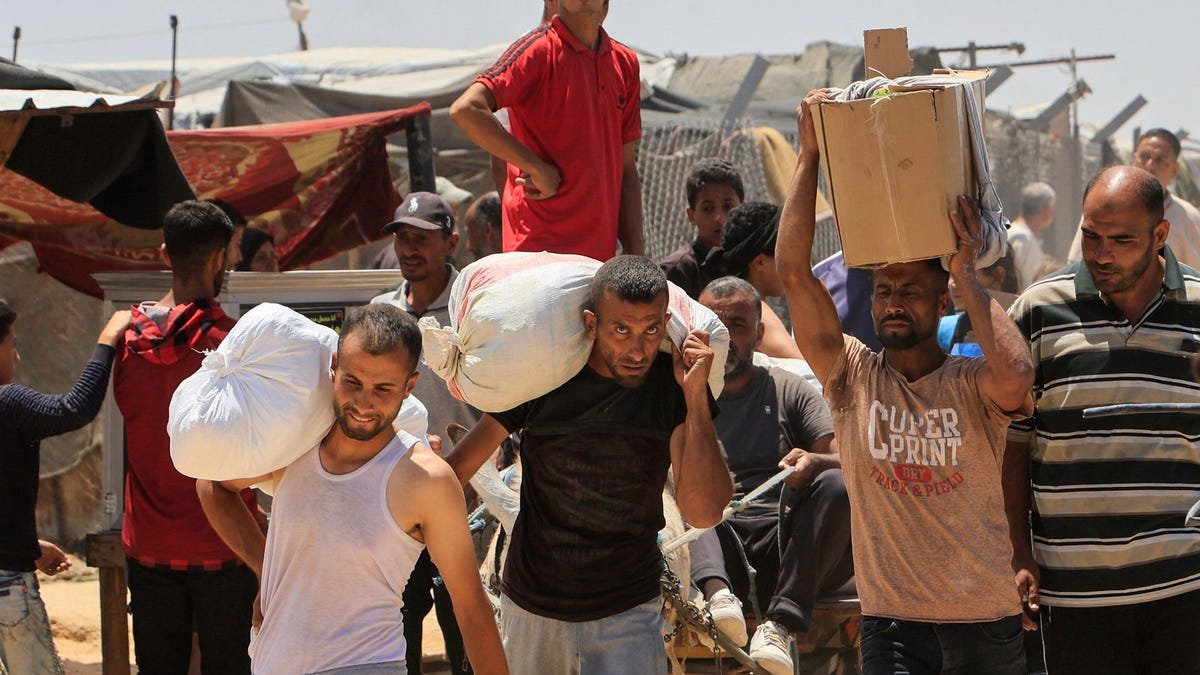People stampeded and shots were fired as a Trump-backed plan to distribute food in Gaza at sites guarded by armed contractors got underway.
Israel prepares to ‘conquer’ and ‘clear out’ all of Gaza
Israeli Prime Minister Benjamin Netanyahu said he plans to “take over” Gaza and move the civilian population southward.
- “We are taking control of the food distribution in the Gaza Strip,” Israeli Prime Minister Benjamin Netanyahu said on May 28.
WASHINGTON − Chaos erupted after a new Trump-backed plan to distribute food in Gaza at sites staffed with armed contractors got under way.
With famine imminent after nearly three months of Israeli blockade, thousands of Palestinians stampeded a fenced checkpoint in southern Gaza on May 27, and Israeli soldiers opened fire, according to Israel’s military and the United Nations.
At least 47 people were injured in the melee, most from gunshots, the U.N. said.
“This is not humanitarianism,” Jonathan Whittall, head of office at the United Nations’ Palestinian affairs agency, said at a May 28 briefing. He said the new aid system continues “collective punishment of Palestinians” and is an “assault on their human dignity.”
Mistrust of the UN
The Gaza Humanitarian Foundation – the murky, fledgling organization distributing food aid – said its staff, anticipating disorder, had “intentionally relaxed its security protocols to safeguard against crowd reactions to finally receiving food.”
Supported by the Trump administration and Israel, the Gaza Humanitarian Foundation has pitched its “secure distribution sites,” staffed with paramilitary contractors, as the solution to Gaza’s humanitarian crisis and Israel’s distrust of the U.N.
Between two operating sites, 14,550 food boxes – each with enough food for 5.5 people over 3.5 days – had been distributed, as of May 28.
But the aid organizations the new foundation wants to replace say its model of militarized aid distribution and its ties to Israel violate basic humanitarian principles.
Those fears come down to “complaints about style,” State Department spokesperson Tammy Bruce said at a May 27 briefing.
“Unfortunately, there are many parties who wish to see GHF fail,” the foundation said.
Foundation director resigns over neutrality
The foundation is off to a rocky start.
The day before it began distributing food aid, Jake Wood, a former Marine who founded the humanitarian response group Team Rubicon, resigned as head of the foundation, citing concerns it could not operate with impartiality.
“It is clear that it is not possible to implement this plan while also strictly adhering to the humanitarian principles of humanity, neutrality, impartiality, and independence,” Wood wrote in a statement.
A member of the group told USA TODAY that Wood felt the aid plan could not run independently of Israel’s military operations.
Humanitarian groups in Gaza had long aired similar critiques.
“This is a plan that has not demonstrated that it would be fully impartial, or that it would provide enough aid to all those in need in Gaza to prevent looting and diversion for profit,” said Sean Carroll, president and CEO of U.S. aid group Anera.
The New York Times reported on May 24 that the foundation originated from a group of Israeli and American military and business leaders as a plan to wrest control of Gaza from Hamas and replace the U.N. as the primary distributor of aid in Gaza.
Members of the foundation and U.S. officials, including U.S. ambassador to Israel Mike Huckabee, have insisted it operates independent of Israel.
“The Israelis are going to be involved in providing necessary military security because it is a war zone, but they will not be involved in the distribution of the food or even bringing the food into Gaza,” Huckabee told reporters in Jerusalem on May 9.
Israel has been increasingly vocal in its support of the plan.
“We are taking control of the food distribution in the Gaza Strip,” Prime Minister Benjamin Netanyahu said on May 28.
In a statement released after Wood’s resignation, the foundation said it was “disappointed” by his departure.
“Unfortunately, from the moment GHF was announced, those who benefit from the status quo have been more focused on tearing this apart than on getting aid in,” the statement said. Wood and GHF did not return requests for comment.
Suspicion from humanitarian groups
Israel lifted its blockade on all humanitarian aid into Gaza early last week, allowing the first trucks in more than two months on May 19 to trickle into the war-ravaged enclave.
Around 100 trucks have entered daily since then, but humanitarians say it’s a fraction of what is needed to prevent famine.
“It’s a drop in the bucket,” Cindy McCain, director of the World Food Program, said May 25 on CBS’ “Face the Nation.”
Israel cut off humanitarian aid in early March, after a ceasefire with Hamas broke down. As of mid-May, 470,000 people there face catastrophic hunger, and the entire population is experiencing acute food insecurity, according to WFP.
As aid groups clamored for access, the Gaza Humanitarian Foundation stepped onto the scene. In addition to Wood, the foundation’s board included Nate Mook, a former CEO of World Central Kitchen and Bill Miller, a former U.N. director, and corporate executives. Former military and intelligence personnel were also involved, chief among them Phil Reilly, a veteran CIA paramilitary officer turned security contractor.
In calls aid workers said were led by Aryeh Lightstone, an aide to President Donald Trump’s envoy Steve Witkoff, the foundation sought to win over humanitarian organizations already on the ground.
They did not succeed.
As aid workers learned more about the plan, they concluded it was at best ineffective and at worst risked militarizing aid distribution to serve Israel’s wartime goals. Suspicion grew that the organization was an Israeli government front. Reports that the foundation would use biometric technology to identify and track Palestinians sparked alarm.
“I don’t see it happening. How do you serve 2 million people overnight?” Bushra Khalidi, Oxfam’s policy lead for Palestine, said, citing the foundation’s limited distribution sites and lack of experience.
The plan is “a process of militarizing and controlling aid to a much higher degree,” said Joseph Belliveau, executive director of Illinois-based MedGlobal. People will fear coming to a distribution site that is “under the gun,” he said.
According to a publicly available planning document and a member of the foundation, the group’s model of securitized aid “hubs” was meant to address Israel’s accusations that Hamas loots aid, while getting more assistance into Gaza.
In her Face the Nation interview, McCain said there was no evidence of Hamas stealing food aid in the most current round of distribution. She did not address previous rounds.
“This doesn’t have anything to do with Hamas or any kind of organized crime,” McCain, the widow of Republican Sen. John McCain, said in the interview. “It has simply to do with the fact these people are starving to death.”
The foundation also ignited fears among some humanitarians that it would work in tandem with Israel’s military operations to forcibly displace Palestinians from north Gaza into the southern part of the enclave.
“The biggest fear is that, with a concentration of food provision in the south, it will be complicit in forced displacement, which is a war crime,” said Carroll.
Israel launched a new military operation – dubbed “Gideon’s chariots” – in Gaza earlier in May that left more than 500 people dead in the span of eight days. It was unclear how many were civilians and how many were combatants.
On May 26, the day the foundation launched its aid operation, at least 45 people were killed throughout the Gaza strip.
More than 53,000 Palestinians have been killed in Gaza since Hamas launched an Oct. 7, 2023, raid on southern Israel that took 1,200 lives.
Netanyahu said May 19 that Israel would achieve “complete victory” and control the entire enclave; Israeli officials have outlined a goal to push Palestinians to Gaza’s south.
Palestinians in northern Gaza have received evacuation orders in recent days. Khalidi said her colleagues were told by the Israeli military to evacuate from northern Gaza and Deir al-Balah in central Gaza.
Military contractors to guard aid distribution
The new foundation would first establish four “secure distribution sites” – each one to serve 300,000 people with “pre-packaged rations” of 1750-calorie meals, “hygiene kits and medical supplies,” according to the initial plan.
Armored vehicles would transport the supplies to the hubs, which would be guarded by armed security contractors. The aid would “move through tightly controlled corridors, monitored in real time to prevent diversion,” according to a planning document.
The firms providing security include Safe Reach Solutions, founded by Reilly, and UG Solutions, which was tasked earlier this year with guarding the Netzarim Corridor, a road that runs across the middle of Gaza, according to reports.
Safe Reach Solutions has posted a job listing for a “humanitarian liaison officer” and UG Solutions for an “international humanitarian security specialist” on LinkedIn in recent weeks.
A member of the foundation said the group may seek assistance from Egypt or other countries in the region, since almost none of the contractors speaks Arabic.
It is also unclear how the plan is funded. The foundation registered in Switzerland in February – according to its planning document, its Swiss branch would “address donors who would prefer to participate outside of the U.S. structure.”
TRIAL International, a Switzerland-based legal nonprofit, filed legal submissions on May 23 asking for the foundation’s funding to be investigated to determine if it is operating “in line with Swiss law and international humanitarian law,” according to a press release.
‘Too weak to cry’
Khalidi and other aid workers say the situation in Gaza is unthinkably dire.
Although aid trucks had entered, food distribution has been minimal. Only four bakeries were able to operate in Gaza due to lack of fuel as of May 24, according to Khalidi.
Meanwhile, health workers in the enclave reported to her that they saw “children with symptoms of malnutrition and severe acute malnutrition” and “numerous cases of severe diarrhea.”
Children are “so hungry that they’re too weak to cry,” she said.
Belliveau said that, as of May 23, no MedGlobal trucks had gotten into Gaza, and overall, far less than the promised 100 trucks had reached Gazans. The organization’s doctors and nurses are already on the ground, but they need MedGlobal’s medicine and therapeutic food to be allowed in, he said.
“The real solution here is to lift the blockade and just let us do our do our jobs,” he said.


